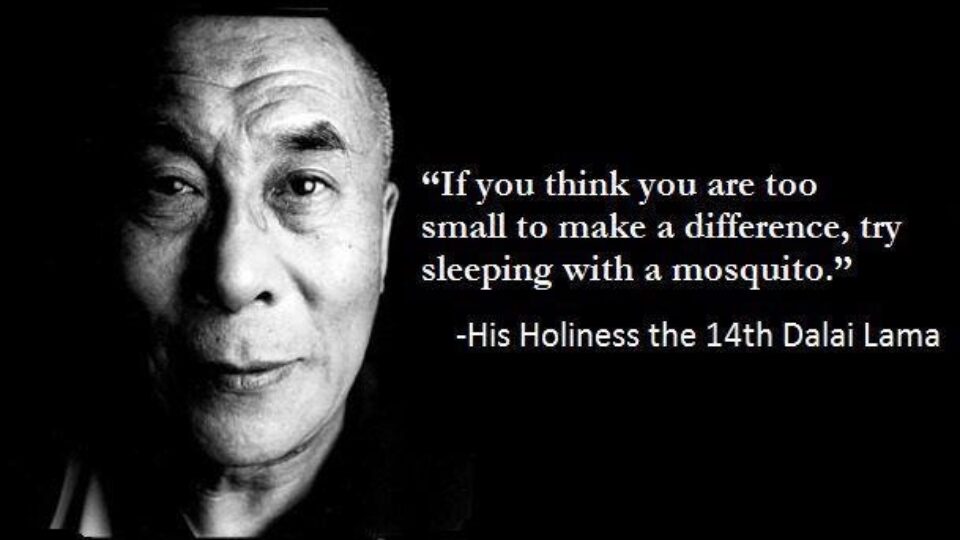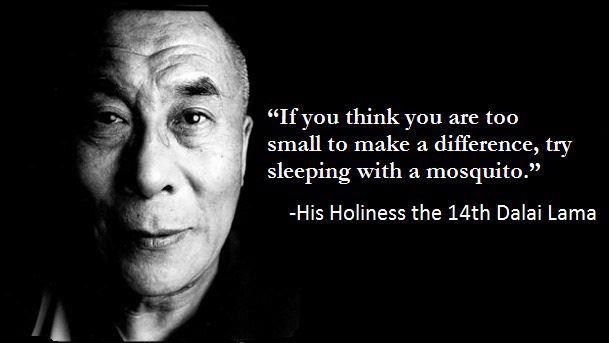
24 Jun2016

share



She asked him, “Have you ever had to forgive yourself for something?” His Holiness replied, “My attitude towards mosquitoes is not very favorable, not very peaceful. Bed bugs also.”
Oprah was astounded that there was nothing else to be forgiven for in a life spanning 78 years. Forgiveness and compassion for all living creatures are the two pillars of the Dalai Lama’s teachings.
The Dalai Lama’s tips to a more fulfilled life seem so simple but it is putting them into practice that often proves the challenge …
“The topic of compassion is not at all religious business; it is important to know it is human business, it is a question of human survival.”
Research now shows that when you are compassionate, you experience a similar feeling of pleasure as when you have sex, good food or a relaxing holiday. Basically, showing compassion is good for your health. Take compassionate action and get the “giver’s high.” Benefits are reduced stress, more regular heart beat and improved immune system.
You can show compassion by understanding the person’s feelings and emotions. That means talking to them and trying to share what they are going through. It is more demanding than a mere act of kindness. If you are compassionate, you are going to get emotionally involved.
“This is my simple religion. There is no need for temples; no need for complicated philosophy. Our own brain, our own heart is our temple; the philosophy is kindness.”
Being kind and generous costs little and the benefits you gain in happiness are considerable. That was the conclusion that Michael Norton and colleagues at the Harvard Business School came to, after doing some very interesting research. The volunteers who gave away some money were happier than those who had spent it on themselves.
“The purpose of our lives is to be happy.”
In the rat race, the one thing you really want at the end of the day is the capacity to find happiness.
“Happiness is not ready made—it comes from our own actions.”
The Dalai Lama advises everybody to spend a little time alone each day. Time to reflect and chase away the negative thoughts such as anger, resentment, jealousy, and tiredness. Try to replace those with positive emotions such as optimism, gratitude, love, and peace. He rightly says that the truly calm mind is the source of happiness and good health.
“If you can, help others; if you cannot do that, at least do not harm them.”
If you start telling lies, gossiping and spreading nasty rumors, bullying, and taking advantage of others, then the negative fallout from them will come back to haunt you.
Friendships should never be undervalued. They need tender loving care because they can generate trust and affection. Real friendships will never depend on money or political clout. It is a sad fact that neglected or stillborn friendships lead to loneliness. This is one of the risk factors which probably contributes to depression in our society.
Did you know that the Dalai Lama has over 8 million followers on Twitter? While he admires the advances in social media in helping us to communicate, he nevertheless warns against its overuse for the following reasons:
It can control your life—look at people in restaurants using their cell phones.
Who is in charge? You or the technology?
It is a poor substitute for real friendship.
It cannot help you to be compassionate.
Real human interaction will suffer.
“We are the controller of the technology. If we become a slave of technology, then that’s not good.”
“Non-violence means dialogue, using our language, the human language. Dialogue means compromise; respecting each other’s rights; in the spirit of reconciliation there is a real solution to conflict and disagreement. There is no hundred percent winner, no hundred percent loser—not that way but half-and-half. That is the practical way, the only way.”
In order to survive, we have a duty to preserve this planet as best we can. Learning how to recycle, looking at ways to create alternative energy, and learning about the current issues are all ways that can help to delay the tipping point.
“When you lose, don’t lose the lesson.”
When you screw up, it is important to examine what went wrong. Maybe you said the wrong thing or maybe you haven’t thought the whole process through. Perhaps there was a problem in planning the project and maybe you did not think about worst-case scenarios. Reflection can help you learn every time you fail.
Try to apply these lessons to your life and work. You will soon discover that truth, honesty, warm-heartedness and compassion will be the driving forces in your life and will help you to gain real happiness.